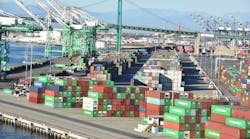Supply Chain Leaders Are Optimistic About Capacity Ahead of ‘Official’ Peak Shipping Season
Companies have confidence in their e-commerce strategies ahead of the official 2021 peak shipping season that traditionally runs from September through December, according to a study released on August 31 from GlobalTranz Enterprices, LLC.
At the same time, the survey of supply chain decision-makers highlights anticipated challenges for the second half of the year, from new COVID-19 variants threatening another phase of lockdowns to ongoing challenges in recruiting and retaining employees.
“While the resurgence of COVID-19 has created another element of uncertainty heading into peak season, we’re seeing cautious optimism around how supply chains have adapted to the challenges of the past year,” said Ross Spanier, executive vice president of Direct Channel at GlobalTranz said in a statement. “Businesses have put in place new supply chain strategies and established partnerships with logistics providers that can help them manage through this volatile environment.”
Peak Shipping Season Looms Large with Supply Chains Already Operating at Capacity
Global supply chains have operated at or near peak levels of demand since the summer of 2020, with little reprieve heading into the official 2021 peak shipping season. Despite ongoing disruptions, decision-makers feel their companies are more prepared to meet customer demands through the holiday season and beyond.
About three quarters (76%) of decision-makers expect that their 2021 peak season revenue will be higher than the previous year. Additional findings include:
- 9 in 10 decision-makers indicate they need to increase hiring to meet customer demand
- Over 70% agree that they’ve seen an increase in customers wanting last mile delivery solutions and higher demand for white glove services (e.g. in-home installation, haul away)
- 94% noted that partnerships with supply chain/logistics companies are necessary to get through peak season successfully
In addition, survey respondents noted concern for how a resurgence of COVID-19 may impact their company’s ability to meet customer needs over the coming months.
- 3 out of 4 (79%) are concerned that a resurgence of COVID-19 will negatively impact their businesses’ supply chain operations
- 51% of supply chain leaders ranked future lockdowns related to COVID-19 as a top challenge, an increase of 24 percentage points from Spring 2021
Workforce needs, rising costs and supply chain congestion take precedent
While supply chains have proven resilient and adaptable over the course of the last 18 months, a strain on available resources and increasing costs are a cause for concern. Issues around workforce availability and material shortages are likely to persist well into 2022 as companies make moves to address them in the coming months.
- At least one-third of respondents cite supply chain congestion, rising transportation costs, workforce deficits and potential lockdowns related to COVID-19 as top concerns
- Nearly half (47%) of respondents say they will be paying higher salaries or wages to both attract new talent and retain current employees before the end of the 2021 calendar year
- More than 30% of respondents note having enough resources to meet the demand of consumers and keeping deliveries to end-users on time as more challenging this peak season than in 2020
“The survey results indicate that supply chain professionals continue to adapt to a myriad of changes in the business environment and shifting consumer behavior,” says Spanier. “Yet there is still optimism among leadership who went through the experiences of the past 18 months and are investing in the tools and partnerships that will help their businesses succeed.”



